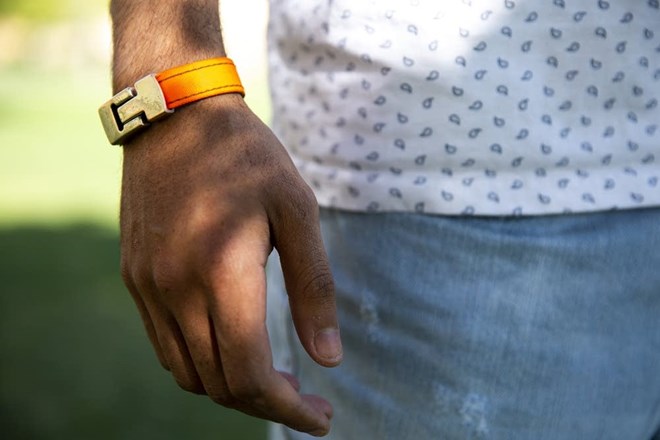
Friday May 18, 2018
 Mohamed Malim models an Embracelet, a bracelet made from recycled lifejackets worn by refugees crossing the Mediterranean. Evan Frost | MPR News
Mohamed Malim models an Embracelet, a bracelet made from recycled lifejackets worn by refugees crossing the Mediterranean. Evan Frost | MPR News
It's a stunning image:
Thousands of life jackets piling up onto Greek beaches. They were worn
by refugees who traveled by boat to escape war and poverty and finally
reached safer shores.
Now scraps of those discarded life vests are finding their way onto the
wrists of Minnesotans. A young entrepreneur is turning those tangible
pieces of the refugee journey into something more.
Mohamed Malim, 22, has always dreamed of starting a fashion brand. His
first product is the eye-catching, blaze-orange bracelet. The outside
material is made of recycled life jackets that refugees have worn, and
the inside is leather inscribed with the words: "Building humanity piece
by piece."
He named his company Epimonia,
from the Greek word epimoní, which means perseverance. The name of the
accessory is the "embracelet." Malim says it's intended to be a symbol
of embracing refugees and humanity at large.
"We wanted to create these life jackets into hope," Malim said.
Malim knows the refugee story firsthand. His parents fled Somalia's
civil war, and he was born in a camp in Kenya, where he lived the first
few years of his life. Today he's a senior at the University of St.
Thomas, studying business. The embracelet is a vehicle for making money
that he can then distribute to Minnesota nonprofits that serve refugees.
Malim said the venture wouldn't have been possible without a key family member: his uncle, Omar Munie, a fashion designer from the Netherlands.
Munie crafts handbags worn by some of the biggest names in his country,
but he said he's derived the most satisfaction from designing products
that are sustainable and have a deeper purpose. Last year he created the
embracelet and started selling it in the Netherlands.
Here's how it's made: Munie partnered with a nonprofit, the
Amsterdam-based Movement on the Ground, that collects the life jackets
from the shores of the Greek island of Lesbos. It's home to an
overcrowded camp brimming with asylum seekers from places like Syria and
Iraq. Workers in Munie's design studio, including six refugees from all
over the world, make the bracelets using the orange fabric from the
life vests. Each jacket can be turned into about 25 bracelets.
Munie said he was grateful for the opportunities he's had ever since
arriving in the Netherlands as a 9-year-old. But he worries that
anti-immigrant sentiments in Europe and in the United States will make
it harder for today's refugee kids.
"I need to give something back," he said. "I know how these people feel.
We have a little bit of pressure here, like, 'What are we going to do
with all these refugees? We have a small country, and there is no
space.' I had the biggest and finest opportunities. These people deserve
the same opportunities I had."
When his American nephew offered to sell and distribute the bracelet stateside, Munie didn't hesitate to partner with him.
"America really needs it right now," Munie said. "It's painful to see what's happening there."
In St. Paul, Mohamed Malim said he's sold 150 bracelets, mostly through social media. Epimonia's Instagram page
features attractive millennials of all races sporting the $40
wristband. Malim said half the proceeds will go to Minnesota nonprofits
that help refugees. He just cut a $1,000 check to a resettlement agency,
the International Institute of Minnesota.
But that's not all he's working on. With the help of a photographer and a
journalist, Malim founded Dream Refugee. It's a website that features
the stories of prominent refugees, from Somali-Minnesotan model Halima
Aden to Carlos Gutierrez, a former Cabinet member under George W. Bush.
Malim said he felt he needed to do something after Donald Trump painted a
bleak picture of the Somali community during a campaign stop in
Minnesota.
The imbalance of stories in the news can be exasperating, Malim said.
"Come on, share stories of success," he said. "If you bring more
[hateful] news stories about specific communities, you'll see a lot of
hate. But if you transform, change that narrative and share success
stories of how these Hmong communities or Somali communities — how these
refugees contribute to Minnesota, you'll see [a community] more united
and more hopeful."
Malim, a graduate of Edina High School, brought on his childhood soccer
teammate, Amin Abdulkadir, to help him with Epimonia. The two say
they've begun to feel a more pronounced backlash against refugees and
Muslims after Trump's election. But Abdulkadir said it might also have
to do with the fact that they're becoming older and are no longer
protected from hurtful rhetoric. Even while they were shooting a
promotional video for Epimonia on the Stone Arch Bridge, they said, a
middle-aged white man provoked them with slurs and told them to "go back
to your own country."
"He didn't even know we were trying to do something good in the world," Abdulkadir said.
Malim graduates from St. Thomas on Saturday. After that, he plans to
expand Dream Refugee and Epimonia and spread those stories of hope.
Maybe, he said, those life jackets can be stitched into high-fashion
handbags.
Munie said he's proud of his nephew and will encourage him. When he was
starting out as a designer at 17, his mother balked at the idea, Munie
recalled.
"That's what my mom always said to me — 'What? You're going to make
handbags?' It was a very disappointing thing for her in the beginning,"
Munie said. "Mohamed, he has the same thing. His mom — who's my sister —
I still need to talk with her to say, 'Let Mohamed do his own thing.'
He's going after his dreams."